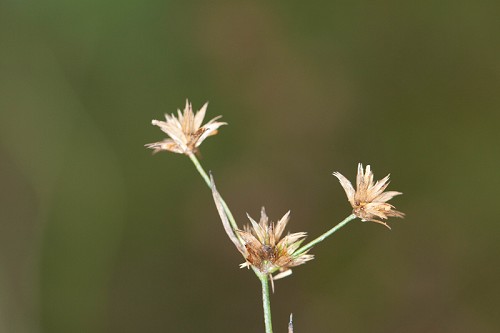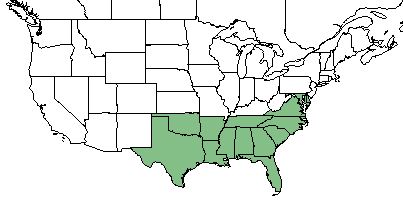Difference between revisions of "Juncus repens"
Emmazeitler (talk | contribs) |
|||
| Line 1: | Line 1: | ||
{{italic title}} | {{italic title}} | ||
| − | Common names: | + | Common names: Creeping rush<ref name="weakley">Weakley, A.S. 2015. Flora of the southern and mid-atlantic states. Working Draft of 21 May 2015. University of North Carolina at Chapel Hill, Chapel Hill, North Carolina.</ref> |
| + | |||
<!-- Get the taxonomy information from the NRCS Plants database --> | <!-- Get the taxonomy information from the NRCS Plants database --> | ||
{{taxobox | {{taxobox | ||
| Line 19: | Line 20: | ||
}} | }} | ||
==Taxonomic Notes== | ==Taxonomic Notes== | ||
| − | Synonyms: none | + | Synonyms: none.<ref name="weakley">Weakley, A.S. 2015. Flora of the southern and mid-atlantic states. Working Draft of 21 May 2015. University of North Carolina at Chapel Hill, Chapel Hill, North Carolina.</ref> |
| − | Varieties: none | + | Varieties: none.<ref name="weakley">Weakley, A.S. 2015. Flora of the southern and mid-atlantic states. Working Draft of 21 May 2015. University of North Carolina at Chapel Hill, Chapel Hill, North Carolina.</ref> |
==Description== | ==Description== | ||
<!-- Basic life history facts such as annual/perrenial, monoecious/dioecious, root morphology, seed type, etc. --> | <!-- Basic life history facts such as annual/perrenial, monoecious/dioecious, root morphology, seed type, etc. --> | ||
| − | ''J. repens'', also known as lesser creeping rush, is a native annual perennial with a graminoid growth habit that is in the Juncaceae family. It contains rhizomatous growth for rapid clonal reproduction as well. The mature height can reach up to 6.8 feet, yet a short lifespan. <ref name= "USDA"> USDA Plants Database URL: https://plants.usda.gov/core/profile?symbol=JURE2 </ref> | + | ''J. repens'', also known as lesser creeping rush, is a native annual perennial with a graminoid growth habit that is in the Juncaceae family. It contains rhizomatous growth for rapid clonal reproduction as well. The mature height can reach up to 6.8 feet, yet a short lifespan.<ref name= "USDA"> USDA Plants Database URL: https://plants.usda.gov/core/profile?symbol=JURE2 </ref> |
==Distribution== | ==Distribution== | ||
| − | ''J. repens'' can be found along the Gulf of Mexico coast and Atlantic coast in the Southeast United States, ranging from east Texas to Virginia and Maryland. <ref name= "USDA"/> | + | ''J. repens'' can be found along the Gulf of Mexico coast and Atlantic coast in the Southeast United States, ranging from east Texas to Virginia and Maryland.<ref name= "USDA"/> |
==Ecology== | ==Ecology== | ||
===Habitat=== <!--Natural communities, human disturbed habitats, topography, hydrology, soils, light, fire regime requirements for removal of competition, etc.--> | ===Habitat=== <!--Natural communities, human disturbed habitats, topography, hydrology, soils, light, fire regime requirements for removal of competition, etc.--> | ||
| − | The main communities include streams, ponds, lakes, ditches, wet depressions in flatwoods, and cypress savannahs. <ref name= "Weakley"> Weakley, A. S. (2015). Flora of the Southern and Mid-Atlantic States. Chapel Hill, NC, University of North Carolina Herbarium. </ref> ''J. repens'' has been observed in moist loamy soil of oak-hickory woods, in shallow ditches, in cabbage palm hammocks, in wet muck disturbed sites, and muddy depressions. <ref name= "Herbarium"> Florida State University Robert K. Godfrey Herbarium database. URL: http://herbarium.bio.fsu.edu. Last accessed: June 2018. Collectors: R. A. Norris, N. Hotchkiss, R. F. Doren, Robert K. Godfrey, Loran C. Anderson, Lisa Keppner, Cecil R. Slaughter, and Floyd Griffith. States and counties: Florida: Volusia, Leon, Washington, Osceola, St Johns, Jackson, and Jefferson. Georgia: Atkinson, Grady, and Thomas. </ref> | + | The main communities include streams, ponds, lakes, ditches, wet depressions in flatwoods, and cypress savannahs.<ref name= "Weakley"> Weakley, A. S. (2015). Flora of the Southern and Mid-Atlantic States. Chapel Hill, NC, University of North Carolina Herbarium. </ref> ''J. repens'' has been observed in moist loamy soil of oak-hickory woods, in shallow ditches, in cabbage palm hammocks, in wet muck disturbed sites, and muddy depressions.<ref name= "Herbarium"> Florida State University Robert K. Godfrey Herbarium database. URL: http://herbarium.bio.fsu.edu. Last accessed: June 2018. Collectors: R. A. Norris, N. Hotchkiss, R. F. Doren, Robert K. Godfrey, Loran C. Anderson, Lisa Keppner, Cecil R. Slaughter, and Floyd Griffith. States and counties: Florida: Volusia, Leon, Washington, Osceola, St Johns, Jackson, and Jefferson. Georgia: Atkinson, Grady, and Thomas. </ref> |
| − | Associated species - ''Taxodium'' spp. <ref name= "Herbarium"/> | + | Associated species - ''Taxodium'' spp.<ref name= "Herbarium"/> |
===Phenology=== <!--Timing off flowering, fruiting, seed dispersal, and environmental triggers. Cite PanFlora website if appropriate: http://www.gilnelson.com/PanFlora/ --> | ===Phenology=== <!--Timing off flowering, fruiting, seed dispersal, and environmental triggers. Cite PanFlora website if appropriate: http://www.gilnelson.com/PanFlora/ --> | ||
| − | Flowering time begins in | + | Flowering time begins in June and continues into October.<ref name= "Herbarium"> Florida State University Robert K. Godfrey Herbarium database. URL: http://herbarium.bio.fsu.edu. Last accessed: May 2018. Collectors: R. A. Norris, N. Hotchkiss, R. F. Doren, Robert K. Godfrey, Loran C. Anderson, Lisa Keppner, and Cecil R. Slaughter. States and Counties: Florida: Volusia, Leon, Washington, St. Johns, Jackson, and Jefferson. Georgia: Atkinson, Grady, and Thomas. </ref> |
<!--===Seed dispersal===--> | <!--===Seed dispersal===--> | ||
Revision as of 17:18, 17 September 2020
Common names: Creeping rush[1]
| Juncus repens | |
|---|---|

| |
| Photo by the Southeastern Flora Database | |
| Scientific classification | |
| Kingdom: | Plantae |
| Division: | Magnoliophyta - Flowering plants |
| Class: | Liliopsida - Moncots |
| Order: | Juncales |
| Family: | Juncaceae |
| Genus: | Juncus |
| Species: | J. repens |
| Binomial name | |
| Juncus repens Michx. | |

| |
| Natural range of Juncus repens from USDA NRCS Plants Database. | |
Contents
Taxonomic Notes
Synonyms: none.[1]
Varieties: none.[1]
Description
J. repens, also known as lesser creeping rush, is a native annual perennial with a graminoid growth habit that is in the Juncaceae family. It contains rhizomatous growth for rapid clonal reproduction as well. The mature height can reach up to 6.8 feet, yet a short lifespan.[2]
Distribution
J. repens can be found along the Gulf of Mexico coast and Atlantic coast in the Southeast United States, ranging from east Texas to Virginia and Maryland.[2]
Ecology
Habitat
The main communities include streams, ponds, lakes, ditches, wet depressions in flatwoods, and cypress savannahs.[3] J. repens has been observed in moist loamy soil of oak-hickory woods, in shallow ditches, in cabbage palm hammocks, in wet muck disturbed sites, and muddy depressions.[4]
Associated species - Taxodium spp.[4]
Phenology
Flowering time begins in June and continues into October.[4]
Conservation and Management
Cultivation and restoration
Photo Gallery
References and notes
- ↑ 1.0 1.1 1.2 Weakley, A.S. 2015. Flora of the southern and mid-atlantic states. Working Draft of 21 May 2015. University of North Carolina at Chapel Hill, Chapel Hill, North Carolina.
- ↑ 2.0 2.1 USDA Plants Database URL: https://plants.usda.gov/core/profile?symbol=JURE2
- ↑ Weakley, A. S. (2015). Flora of the Southern and Mid-Atlantic States. Chapel Hill, NC, University of North Carolina Herbarium.
- ↑ 4.0 4.1 4.2 Florida State University Robert K. Godfrey Herbarium database. URL: http://herbarium.bio.fsu.edu. Last accessed: June 2018. Collectors: R. A. Norris, N. Hotchkiss, R. F. Doren, Robert K. Godfrey, Loran C. Anderson, Lisa Keppner, Cecil R. Slaughter, and Floyd Griffith. States and counties: Florida: Volusia, Leon, Washington, Osceola, St Johns, Jackson, and Jefferson. Georgia: Atkinson, Grady, and Thomas. Cite error: Invalid
<ref>tag; name "Herbarium" defined multiple times with different content